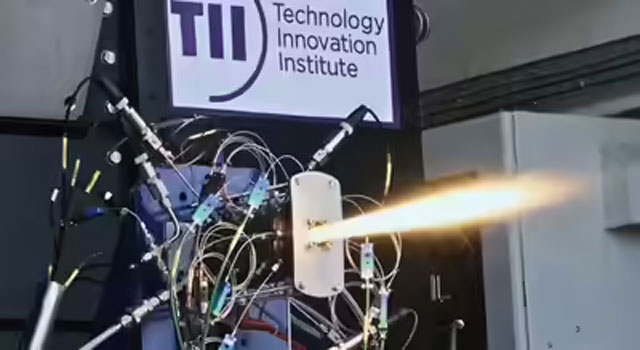Daijiworld Media Network – Abu Dhabi
Abu Dhabi, Oct 13: In a landmark achievement for its space ambitions, the UAE has successfully designed, built, and test-fired its first liquid-fuelled rocket engine, marking a major step toward independent space propulsion capabilities.
Developed entirely in Abu Dhabi by the Technology Innovation Institute (TII), the 250-newton-class engine underwent over 50 hot-fire tests, achieving 94% combustion efficiency — a benchmark comparable to established global programs. The engine, capable of lifting 25 kilograms on Earth, is designed for small satellite propulsion, orbital manoeuvres, and attitude control, paving the way for future orbital and deep-space missions.

Dr. Najwa Aaraj, CEO of TII, said, “This engine is the foundation for building the capability that will empower the UAE to design, test, and deploy propulsion systems supporting a wide range of future missions.”
Nearly half of the core engineering team were Emirati nationals, who led critical tasks including thermal simulations, injector design, and test protocol development. Despite lacking permanent testing infrastructure, the team improvised cold-flow rigs locally and conducted live hot-fire tests with international collaboration.
Looking ahead, the UAE plans to establish its first static-fire testing facility by 2026, capable of handling engines up to five times more powerful, and to fire its first 1-kilonewton-class engine on Emirati soil the same year. Future goals include larger engines, regenerative cooling systems, cryogenic propellants, and fully sovereign launch capabilities.
With this milestone, the UAE joins an elite group of nations with proven liquid propulsion expertise, including the US, China, Russia, India, Japan, and the European Space Agency, highlighting its commitment to independent and sustainable space exploration.
Dr. Elias Tsoutsanis, Chief Researcher at TII, said, “Our aim is not just to build engines, but to enable the UAE to access space independently, repeatedly, and sustainably.”
For the engineers involved, particularly the Emirati members, the achievement is both professional and deeply personal, signalling a new era for the UAE’s space program.